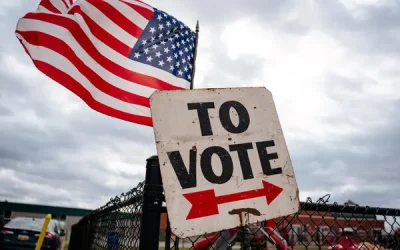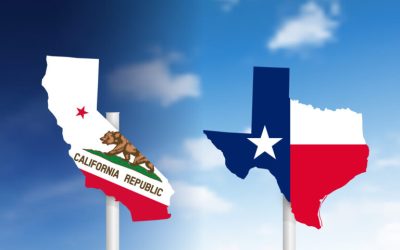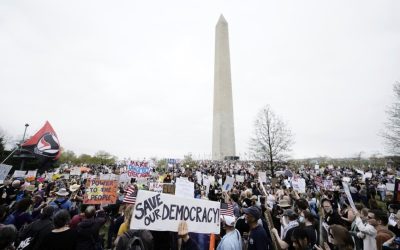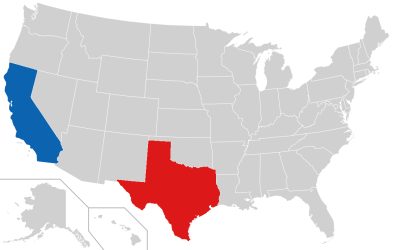On February 2, 2026 President Donald Trump stated in a podcast interview that Republicans in a number of states should take over elections in their states in order to protect the political party. He then added that elections in the United States should be “nationalized” and run by the Federal Government rather than the current setup where elections are run by individual states.
Civil Rights
An Analysis of the California – Texas Re-Districting Fight (Civil Rights Brief #249)
After the State of Texas’ approval of a re – drawn state congressional map that would be used in 2026 to give them five more likely Republican districts, the State of California decided to respond.
Can The Government Prosecute Protesters For Their Speech? (Civil Rights Policy Brief #248)
During a small outing by President Trump and a small group of officials at a public restaurant in Washington, D.C., the President was met by a small group of protesters. The protesters chanted “Free DC” and “Free Palestine” and also “Trump is the Hitler of our time!” The protesters were ultimately removed. However, the President later suggested the protesters should be charged under a racketeering statute since he said one of the protesters was a “paid agitator.” It is unclear where the President receivedthis bit of info or if it is even true. After this incident, Deputy Attorney General Todd Blanche gave an interview where he defended the idea of prosecuting protesters.
The Texas and California Re – Districting Fight Explained
At the end of July 2025 President Trump suggested that Texas should re – district (or, redraw) their state congressional map prior to the 2026 general election. Trump’s purpose in suggesting a redraw of the map was to add five more reliably Republican districts in Texas. This would likely give the Texas congressional delegation five additional members of the House of Representatives in Washington. Texas Governor Greg Abbott then called a special session of the Texas State Legislature to consider the issue and issue a new map ahead of the 2026 elections.
Why The Birthright Citizenship Rule Is Still Valid Today And What Comes Next (Civil Rights Brief #245)
On the first day of his second presidential term, President Donald J. Trump issued Executive Order No. 14160. This executive order is popularly known as the birthright citizenship executive order which purports to make changes to the Birthright Citizenship rule embodied in the 14th Amendment to the United States Constitution. That rule declares, with modest exceptions, that children born within the geographic territory of the United States are instantly granted United States citizenship. That constitutional rule was later affirmed by the United States Supreme Court in the 1898 case United States v. Wong Kim Ark. However, with the ongoing national debate on immigration and immigrants in the United States, President Trump made a campaign promise to abolish the rule in order to try and stem the flow of immigrants from Latin American and South American countries to the United States.
The Role of the Judiciary Against The Other Branches of Government – A Historical Background (Civil Rights Policy Brief #244)
Just this week a number of reports have surfaced that detailed President Trump’s frustration with the Supreme Court and both the federal and state level judiciary in general.
The Distinction Between Law and Policy And The Role of The Courts
he beginning of President Trump’s second term saw a slew of executive orders on a number of policies and also saw numerous responses to those orders. More than two hundred legal challenges have been brought to oppose the implementation of these executive orders. The results have been mixed.
The Department of Justice Voting Section’s Shift In Priorities
A number of news outlets have recently reported that the United States Department of Justice’s (DOJ) Civil Rights Division Voting Section has changed their mission statement and its priorities.
Resistance is Not Futile: Upholding Civil Rights and Constitutional Norms to withstand Trump’s Autocratic Aims
In his first 100 days in office, President Trump has pursued a sinister goal of autocracy by relentlessly attacking any and all forms of opposition and repressing civil rights and liberties.
The Administration Efforts to Avoid a Judicial Ruling
On April 9, 2025 the House of Representatives voted on the No Rogue Rulings Act bill. The bill was sponsored by Rep. Darrell Issa (R-CA). H.R. 1526 would prohibit a federal district court judge from issuing an injunction or prohibition regarding a case unless the injunction or prohibition only applied to the parties of the particular case before the district judge’s court. The bill passed the House by a vote of 219 – 213 in favor of the bill, almost exclusively on party lines. One Republican voted against the bill, Rep. Mike Turner from Ohio.
A Court’s Options To Enforce Compliance With Court Orders
Under Rule 3.3 of the American Bar Association’s Model Rules of Professional Conduct, titled “Candor Toward the Tribunal,” a lawyer has a number of duties when dealing with a court of law. Rule 3.3(a)(1) states “A lawyer shall not knowingly make a false statement of fact or law to a tribunal or fail to correct a false statement of material fact or law previously made to the tribunal by the lawyer. Additionally, Rule 3.3(a)(3) provides “A lawyer shall not knowingly offer evidence that the lawyer knows to be false. While these are model rules, each state has a version of these rules, including the section on “Candor Toward the Tribunal,” that all lawyers must abide by when dealing with a tribunal or court.
The Pettiness of President Trump Targeting Law Firms For Revenge
On February 25, 2025 President Donald Trump signed an executive order suspending the security clearances of lawyers and staff at the Washington, D.C. law office of the international law firm Covington & Burling. The firm had provided legal services to former Special Prosecutor Jack Smith.












